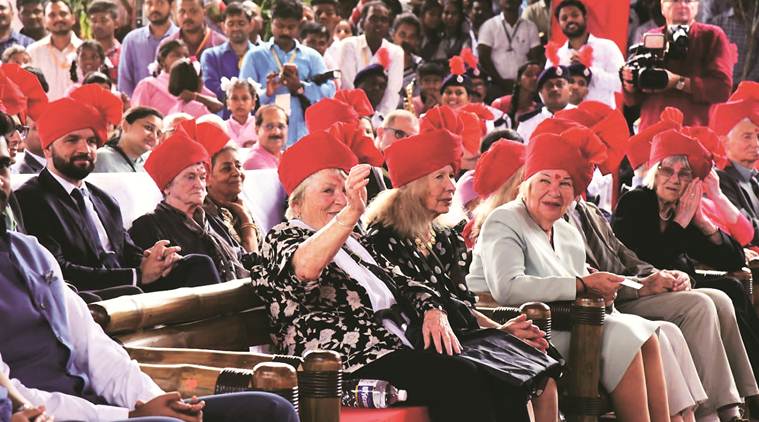
On the second day back in the place he calls his second home, Janusz Osinzky is bursting with stories of the trails he hiked, the rivers he almost drowned in and the local children he wrestled as a Polish refugee in Kolhapur during World War II.
“It was heartbreaking to go back home,” he said of the return journey which began in May 1947 after the end of the War, adding, “we felt relieved here. We didn’t forget that we had come from a concentration camp in Siberia”.
Now an 80-year-old retired lawyer, Osinzky was only six when he arrived at a refugee camp in Valivade village, Kolhapur, with his mother and older brother in 1942, in a contingent of 5,000 Poles who had been forced from their homes by the 1939 German and Soviet invasions.
The last two days for Osinzky and 29 compatriots have been a never-ending trip down memory lane. On Saturday morning, they were guests of honour at a celebration held in the village to announce the development of a museum chronicling life in the camp. The structure will come up in barracks which housed their school nearly eighty years ago.
Yuvraj Sambhajiraje Chhatrapati, a Rajya Sabha MP and heir to the Kolhapur royal family, said that once completed, the museum would comprise exhibits donated by the Poland Embassy, documenting everyday life in the refugee camp.
Once ready in a year’s time, the museum will also inform visitors how Nazi Germany invaded Poland’s western frontier on September 1, 1939 while the Soviet Union invaded from the east on September 17. Early in 1940, the Soviets began to deport Polish nationals to the freezing northern regions of the USSR and displaced several million people from their homes.
After surviving a year in extreme conditions, the refugees found hope when war broke out between Russia and Germany in 1941. Poland and the Soviet Union signed a treaty to re-establish diplomatic relations, and Stalin ordered a one time amnesty for Polish citizens in its camps.
The Polish Army moved over 100,000 Polish soldiers and civilians, 10 per cent of them children, initially transporting several thousand of them by sea to Iran. The Iranian government was unable to cope with the sudden influx of refugees and they were eventually divided into groups of a few thousand and relocated to Africa, Mexico and India, where the royal families of Kolhapur and Jamnagar in Gujarat, showed willingness to house them.
After a six year stay in India, the last of refugees left in 1948.
In the last days in the city, the 13 Poles who experienced life in Valivade have felt the love from locals in the village, at nearby Panhala, whose fort they would trek to regularly, at the town’s landmark Mahalaxmi Temple and at the royal family’s old palace. The group also laid wreaths at a memorial in Mahavir Garden and paid their respects at a crematorium in the city where some of their friends and family are buried.
Expanding on the future of the relationship of two countries forged in adversity, Marcin Przydacz, Poland’s Deputy Foreign Minister, who also spoke at Saturday’s programme, said that two days ago the first direct flights between Delhi and Warsaw became operational. “With new modern transport, we are building on the human relationship formed between the two countries more than 70 years ago,” he said.
But Oszinky insisted on turning back the clock. Recalling the morose train ride to Mumbai from Kolhapur in May 1947, he said that a young boy his age slapped him as he ran past the platform. “The train had stopped at Pune railway station, I was looking out the window when a boy my age slapped me. I was so angry that I wanted to get out and run after him but my mother did not let me do that. We reached Poland on August 15, 1947 and heard news of Indian gaining independence. I realised then that the boy had slapped because he thought I was British. I forgave him,” he said.